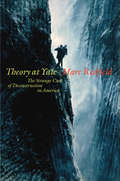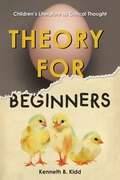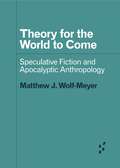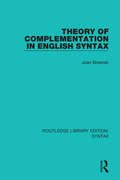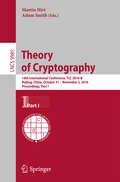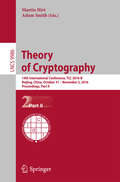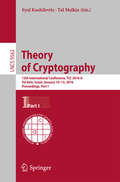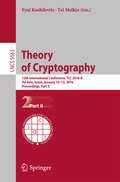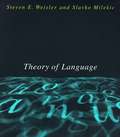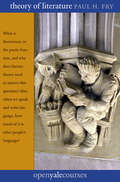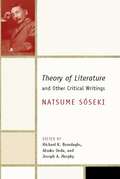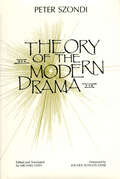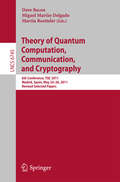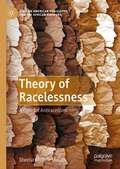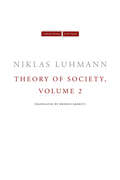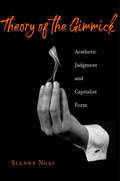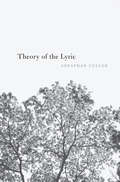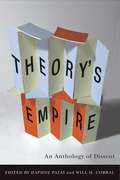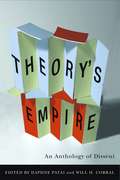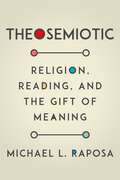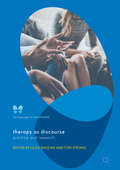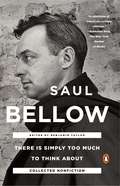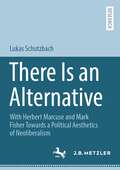- Table View
- List View
Theory at Yale: The Strange Case of Deconstruction in America (Lit Z)
by Marc RedfieldThis book examines the affinity between “theory” and “deconstruction” that developed in the American academy in the 1970s by way of the “Yale Critics”: Harold Bloom, Paul de Man, Geoffrey Hartman, and J. Hillis Miller, sometimes joined by the French philosopher Jacques Derrida.With this semi-fictional collective, theory became a media event, first in the academy and then in the wider print media, in and through its phantasmatic link with deconstruction and with “Yale.” The important role played by aesthetic humanism in American pedagogical discourse provides a context for understanding theory as an aesthetic scandal, and an examination of the ways in which de Man’s work challenges aesthetic pieties helps us understand why, by the 1980s, he above all had come to personify “theory.”Combining a broad account of the “Yale Critics” phenomenon with a series of careful reexaminations of the event of theory, Redfield traces the threat posed by language’s unreliability and inhumanity in chapters on lyric, on Hartman’s representation of the Wordsworthian imagination, on Bloom’s early theory of influence in the 1970s together with his later media reinvention as the genius of the Western Canon, and on John Guillory’s influential attempt to interpret de Manian theory as a symptom of literature’s increasing marginality. A final chapter examines Mark Tansey’s paintings Derrida Queries de Man and Constructing the Grand Canyon, paintings that offer subtle, complex reflections on the peculiar event of theory-as-deconstruction in America.
Theory for Beginners: Children’s Literature as Critical Thought
by Kenneth B. KiddSince its inception in the 1970s, the Philosophy for Children movement (P4C) has affirmed children’s literature as important philosophical work. Theory, meanwhile, has invested in children’s classics, especially Lewis Carroll’s Alice books, and has also developed a literature for beginners that resembles children’s literature in significant ways. Offering a novel take on this phenomenon, Theory for Beginners explores how philosophy and theory draw on children’s literature and have even come to resemble it in their strategies for cultivating the child and/or the beginner. Examining everything from the rise of French Theory in the United States to the crucial pedagogies offered in children’s picture books, from Alison Bechdel’s graphic memoir Are You My Mother? and Lemony Snicket’s A Series of Unfortunate Events to studies of queer childhood, Kenneth B. Kidd deftly reveals the way in which children may learn from philosophy and vice versa.
Theory for the World to Come: Speculative Fiction and Apocalyptic Anthropology (Forerunners: Ideas First)
by Matthew J. Wolf-MeyerCan social theories forge new paths into an uncertain future? The future has become increasingly difficult to imagine. We might be able to predict a few events, but imagining how looming disasters will coincide is simultaneously necessary and impossible. Drawing on speculative fiction and social theory, Theory for the World to Come is the beginning of a conversation about theories that move beyond nihilistic conceptions of the capitalism-caused Anthropocene and toward generative bodies of thought that provoke creative ways of thinking about the world ahead. Matthew J. Wolf-Meyer draws on such authors as Kim Stanley Robinson and Octavia Butler, and engages with afrofuturism, indigenous speculative fiction, and films from the 1970s and &’80s to help think differently about the future and its possibilities.Forerunners: Ideas First Short books of thought-in-process scholarship, where intense analysis, questioning, and speculation take the lead
Theory into Practice: A Reader in Modern Literary Criticism
by Ryan JohnsonStudents of literary theory have been well provided for by the publication of various Readers in literary theory. However, the relation between theory and critical practice still presents a problem to the general reader. This book brings together essays by major critics which apply theory to practice in an accessible way. This will help a general literary readership gain a better understanding of the various types of theoretical criticism, see theory being applied to practice powerfully and persuasively, and encourage students to use theory in their own critical writing.
Theory of Complementation in English Syntax (Routledge Library Editions: Syntax #4)
by Joan BresnanThe subject of this study, first published in 1979, is the role of the complementizer in English syntax and its implications for syntactic theory. It is argued that the familiar transformational treatment of complementizers is inadequate, and that they must be specified in deep structure by means of a Phrase Structure rule. This title will be of interest to students of language and linguistics.
Theory of Cryptography
by Adam Smith Martin HirtThe two-volume set LNCS 9985 and LNCS 9986 constitutes the refereed proceedings of the 14th International Conference on Theory of Cryptography, TCC 2016-B, held in Beijing, China, in November 2016. The total of 45 revised full papers presented in the proceedings were carefully reviewed and selected from 113 submissions. The papers were organized in topical sections named: TCC test-of-time award; foundations; unconditional security; foundations of multi-party protocols; round complexity and efficiency of multi-party computation; differential privacy; delegation and IP; public-key encryption; obfuscation and multilinear maps; attribute-based encryption; functional encryption; secret sharing; new models.
Theory of Cryptography
by Adam Smith Martin HirtThe two-volume set LNCS 9985 and LNCS 9986 constitutes the refereed proceedings of the 14th International Conference on Theory of Cryptography, TCC 2016-B, held in Beijing, China, in November 2016. The total of 45 revised full papers presented in the proceedings were carefully reviewed and selected from 113 submissions. The papers were organized in topical sections named: TCC test-of-time award; foundations; unconditional security; foundations of multi-party protocols; round complexity and efficiency of multi-party computation; differential privacy; delegation and IP; public-key encryption; obfuscation and multilinear maps; attribute-based encryption; functional encryption; secret sharing; new models.
Theory of Cryptography
by Tal Malkin Eyal KushilevitzThe two-volume set LNCS 9562 and LNCS 9563 constitutes the refereed proceedings of the 13th International Conference on Theory of Cryptography, TCC 2016, held in Tel Aviv, Israel, in January 2016. The 45 revised full papers presented were carefully reviewed and selected from 112 submissions. The papers are organized in topical sections on obfuscation, differential privacy, LWR and LPN, public key encryption, signatures, and VRF, complexity of cryptographic primitives, multiparty computation, zero knowledge and PCP, oblivious RAM, ABE and IBE, and codes and interactive proofs. The volume also includes an invited talk on cryptographic assumptions.
Theory of Cryptography
by Tal Malkin Eyal KushilevitzThe two-volume set LNCS 9562 and LNCS 9563 constitutes the refereed proceedings of the 13th International Conference on Theory of Cryptography, TCC 2016, held in Tel Aviv, Israel, in January 2016. The 45 revised full papers presented were carefully reviewed and selected from 112 submissions. The papers are organized in topical sections on obfuscation, differential privacy, LWR and LPN, public key encryption, signatures, and VRF, complexity of cryptographic primitives, multiparty computation, zero knowledge and PCP, oblivious RAM, ABE and IBE, and codes and interactive proofs. The volume also includes an invited talk on cryptographic assumptions.
Theory of Language
by Steven E. Weisler Slavko MilekicIn this introductory-level linguistics text, Steven E. Weisler and Slavko Milekic develop a theoretically motivated analysis of language with an emphasis on grammar construction and argumentation. They introduce the theory of language, sounds, words, sentences, and meaning, as well as language and the brain.
Theory of Literature
by Paul H. FryBringing his perennially popular course to the page, Yale University Professor Paul H. Fry offers in this welcome book a guided tour of the main trends in twentieth-century literary theory. At the core of the book's discussion is a series of underlying questions: What is literature, how is it produced, how can it be understood, and what is its purpose? Fry engages with the major themes and strands in twentieth-century literary theory, among them hermeneutics, modes of formalism, semiotics and Structuralism, deconstruction, psychoanalytic approaches, Marxist and historicist approaches, theories of social identity, Neo-pragmatism and theory. By incorporating philosophical and social perspectives to connect these many trends, the author offers readers a coherent overall context for a deeper and richer reading of literature.
Theory of Literature and Other Critical Writings (Weatherhead Books on Asia)
by Sōseki NatsumeNatsume Soseki (1867-1916) was the foremost Japanese novelist of the twentieth century, known for such highly acclaimed works as Kokoro, Sanshiro, and I Am a Cat. Yet he began his career as a literary theorist and scholar of English literature. In 1907, he published Theory of Literature, a remarkably forward-thinking attempt to understand how and why we read. The text anticipates by decades the ideas and concepts of formalism, structuralism, reader-response theory, and postcolonialism, as well as cognitive approaches to literature that are only now gaining traction. Employing the cutting-edge approaches of contemporary psychology and sociology, Soseki created a model for studying the conscious experience of reading literature as well as a theory for how the process changes over time and across cultures. Along with Theory of Literature, this volume reproduces a later series of lectures and essays in which Soseki continued to develop his theories. By insisting that literary taste is socially and historically determined, Soseki was able to challenge the superiority of the Western canon, and by grounding his theory in scientific knowledge, he was able to claim a universal validity.
Theory of Modern Drama: A Critical Edition
by Peter SzondiTheory of the Modern Drama is a brilliant analysis of the emergence and development of modern drama from the Renaissance to the present day. Szondi shows how the rise of modern drama was linked to broader social processes and expressed some of the beliefs characteristic of early modern Europe. This was manifested in the convention that form was ahistorical and it simply required the appropriate subject matter to do justice to the form. But in the late nineteenth century the form of drama began to change, giving rise to the new types of drama characteristic of the twentieth century. Szondi offers a highly original interpretation of this transformation, linking it with the emergence of an epic form which emphasizes the isolation of the individual. This concise but wide-ranging book discusses the work of Ibsen, Chekhov, Strindberg, Sartre, Brecht and Wilder, among others. It will be essential reading for students of drama, modern languages and literature, and contemporary literary theory.
Theory of Quantum Computation, Communication, and Cryptography
by Dave Bacon Miguel Martin-Delgado Martin RoettelerThis book constitutes the thoroughly refereed post-conference proceedings of the 6th Conference on Theory of Quantum Computation, Communication, and Cryptography, TQC 2011, held in Madrid, Spain, in May 2011. The 14 revised papers presented were carefully selected from numerous submissions. The papers present new and original research and cover a large range of topics in quantum computation, communication and cryptography, a new and interdisciplinary field at the intersection of computer science, information theory and quantum mechanics.
Theory of Racelessness: A Case for Antirace(ism) (African American Philosophy and the African Diaspora)
by Sheena Michele MasonThis book presents a skeptical eliminativist philosophy of race and the theory of racelessness, a methodological and pedagogical framework for analyzing "race" and racism. It explores the history of skeptical eliminativism and constructionist eliminativism within the history of African American philosophy and literary studies and its consistent connection with movements for civil rights. Sheena M. Mason considers how current anti-racist efforts reflect naturalist conservationist and constructionist reconstructionist philosophies of race that prevent more people from fully confronting the problem of racism, not race, thereby enabling racism to persist. She then offers a three-part solution for how scholars and people aspiring toward anti-racism can avoid unintentionally upholding racism, using literary studies as a case study to show how "race" often translates into racism itself. The theory of racelessness helps more people undo racism by undoing the belief in "race."
Theory of Society, Volume 2
by Niklas Luhmann translated by Rhodes BarrettThis second volume of Niklas Luhmanns two-part final work was first published in German in 1997. The culmination of his thirty-year theoretical project to reconceptualize sociology, it offers a comprehensive description of modern society. Beginning with an account of the fluidity of meaning and the accordingly high improbability of successful communication, Luhmann analyzes a range of communicative media, including language, writing, the printing press, and electronic media, as well as "success media," such as money, power, truth, and love, all of which structure this fluidity and make communication possible. The book asks what gives rise to functionally differentiated social systems, how they evolve, and how social movements, organizations, and patterns of interaction emerge. The advent of the computer and its networks, which triggered potentially far-reaching processes of restructuring, receives particular attention. A concluding chapter on the semantics of modern societys self-description bids farewell to the outdated theoretical approaches of "old Europe"--that is, to ontological, holistic, ethical, and critical interpretations of society--and argues that concepts such as "the nation," "the subject," and "postmodernity" are vastly overrated. In their stead, "society"--long considered a suspicious term by sociologists, one open to all kinds of reification--is defined in purely operational terms. It is the always uncertain answer to the question of what comes next in all areas of communication.
Theory of the Gimmick: Aesthetic Judgment and Capitalist Form
by Sianne NgaiA provocative theory of the gimmick as an aesthetic category steeped in the anxieties of capitalism. Repulsive and yet strangely attractive, the gimmick is a form that can be found virtually everywhere in capitalism. It comes in many guises: a musical hook, a financial strategy, a striptease, a novel of ideas. Above all, acclaimed theorist Sianne Ngai argues, the gimmick strikes us both as working too little (a labor-saving trick) and as working too hard (a strained effort to get our attention). Focusing on this connection to work, Ngai draws a line from gimmicks to political economy. When we call something a gimmick, we are registering uncertainties about value bound to labor and time—misgivings that indicate broader anxieties about the measurement of wealth in capitalism. With wit and critical precision, Ngai explores the extravagantly impoverished gimmick across a range of examples: the fiction of Thomas Mann, Helen DeWitt, and Henry James; photographs by Torbjørn Rødland; the video art of Stan Douglas; the theoretical writings of Stanley Cavell and Theodor Adorno. Despite its status as cheap and compromised, the gimmick emerges as a surprisingly powerful tool in this formidable contribution to aesthetic theory.
Theory of the Lyric
by Jonathan CullerWhat sort of thing is a lyric poem? An intense expression of subjective experience? The fictive speech of a specifiable persona? Theory of the Lyric reveals the limitations of these two conceptions of the lyric-the older Romantic model and the modern conception that has come to dominate the study of poetry-both of which neglect what is most striking and compelling in the lyric and falsify the long and rich tradition of the lyric in the West. Jonathan Culler explores alternative conceptions offered by this tradition, such as public discourse made authoritative by its rhythmical structures, and he constructs a more capacious model of the lyric that will help readers appreciate its range of possibilities. Theory of the Lyric constitutes a major advance in our understanding of the Western lyric tradition. Examining ancient as well as modern poems, from Sappho to Ashbery, in many European languages, Culler underscores lyric's surprising continuities across centuries of change-its rhythmical resources, its strange modes of address, its use of the present tense, and the intriguing tension between its ritualistic and fictional dimensions. He defends the idea of lyric as a genre against recent critiques, arguing that lyrics address our world rather than project a fictional world and also challenging the strongly established assumption that poems exist to be interpreted. Theory of the Lyric concludes with a discussion of how to conceive the relations between lyric and society in ways that would acknowledge and respond to lyric's enduring powers of enchantment.
Theory of the Novel
by Guido MazzoniIn his theory of the novel, Guido Mazzoni explains that novels consist of stories told in any way whatsoever about the experiences of ordinary men and women who exist as contingent beings within time and space. Novels allow readers to step into other lives and other versions of truth, each a small, local world, absolute in its particularity.
Theory's Empire: An Anthology of Dissent
by Daphne Patai Will H. CorralNot too long ago, literary theorists were writing about the death of the novel and the death of the author; today many are talking about the death of Theory. Theory, as the many theoretical ism's (among them postcolonialism, postmodernism, and New Historicism) are now known, once seemed so exciting but has become ossified and insular. This iconoclastic collection is an excellent companion to current anthologies of literary theory, which have embraced an uncritical stance toward Theory and its practitioners. Written by nearly fifty prominent scholars, the essays in Theory's Empire question the ideas, catchphrases, and excesses that have let Theory congeal into a predictable orthodoxy. More than just a critique, however, this collection provides readers with effective tools to redeem the study of literature, restore reason to our intellectual life, and redefine the role and place of Theory in the academy.
Theory's Empire: An Anthology of Dissent
by Daphne Patai Wilfrido CorralNot too long ago, literary theorists were writing about the death of the novel and the death of the author; today many are talking about the death of Theory. Theory, as the many theoretical ism's (among them postcolonialism, postmodernism, and New Historicism) are now known, once seemed so exciting but has become ossified and insular. This iconoclastic collection is an excellent companion to current anthologies of literary theory, which have embraced an uncritical stance toward Theory and its practitioners. Written by nearly fifty prominent scholars, the essays in Theory's Empire question the ideas, catchphrases, and excesses that have let Theory congeal into a predictable orthodoxy. More than just a critique, however, this collection provides readers with effective tools to redeem the study of literature, restore reason to our intellectual life, and redefine the role and place of Theory in the academy.
Theosemiotic: Religion, Reading, and the Gift of Meaning
by Michael L. RaposaIn Theosemiotic, Michael Raposa uses Charles Peirce’s semiotic theory to rethink certain issues in contemporary philosophical theology and the philosophy of religion. He first sketches a history that links Peirce’s thought to that of earlier figures (both within the tradition of American religious thought and beyond), as well as to other classical pragmatists and to later thinkers and developments. Drawing on Peirce’s ideas, Raposa develops a semiotic conception of persons/selves emphasizing the role that acts of attention play in shaping human inferences and perception. His central Peircean presuppositions are that all human experience takes the form of semiosis and that the universe is “perfused” with signs. Religious meaning emerges out of a process of continually reading and re-reading certain signs.Theology is explored here in its manifestations as inquiry, therapy, and praxis. By drawing on both Peirce’s logic of vagueness and his logic of relations, Raposa makes sense out of how we talk about God as personal, and also how we understand the character of genuine communities. An investigation of what Peirce meant by “musement” illuminates the nature and purpose of prayer. Theosemiotic is portrayed as a form of religious naturalism, broadly conceived. At the same time, the potential links between any philosophical theology conceived as theosemiotic and liberation theology are exposed.
Therapy as Discourse: Practice and Research (The Language of Mental Health)
by Tom Strong Olga SmoliakThis book addresses the premise that therapy can be understood, practiced, and researched as a discursive activity. Using varied forms of discourse analysis, it examines the cultural, institutional, and face-to-face communications that shape, and occur within, therapies that are discursively understood and practiced. By first providing an overview of commonalities across discursive therapies and research approaches, the authors discursively examine general aspects of therapy. Topics explored include subjectivity, psychological terms, institutional influences, therapeutic relationships, therapists’ ways of talking and questioning, discursive ethics, and assessment of therapeutic processes and outcomes. This book offers a macro-analysis of the conversational practices of a discursively informed approach to therapy; as well as a micro-analysis of the ways in which language shapes and is used in a discursively informed approach to therapy. This book will interest practitioners seeking to better understand therapy as a discursive process, and discourse analysts wanting to understand therapy as discursive therapists might practice it.
There Is Simply Too Much to Think About: Collected Nonfiction
by Saul Bellow Benjamin Taylor“Bellow’s nonfiction has the same strengths as his stories and novels: a dynamic responsiveness to character, place and time (or era) . . . And you wonder—what other highbrow writer, or indeed lowbrow writer has such a reflexive grasp of the street, the machine, the law courts, the rackets?” —Martin Amis, The New York Times Book ReviewThe year 2015 marks several literary milestones: the centennial of Saul Bellow’s birth, the tenth anniversary of his death, and the publication of Zachary Leader’s much anticipated biography. Bellow, a Nobel Laureate, Pulitzer Prize winner, and the only novelist to receive three National Book awards, has long been regarded as one of America’s most cherished authors. Here, Benjamin Taylor, editor of the acclaimed Saul Bellow: Letters, presents lesser-known aspects of the iconic writer.Arranged chronologically, this literary time capsule displays the full extent of Bellow’s nonfiction, including criticism, interviews, speeches, and other reflections, tracing his career from his initial success as a novelist until the end of his life. Bringing together six classic pieces with an abundance of previously uncollected material, There Is Simply Too Much to Think About is a powerful reminder not only of Bellow’s genius but also of his enduring place in the western canon and is sure to be widely reviewed and talked about for years to come.From the Hardcover edition.
There Is an Alternative: With Herbert Marcuse and Mark Fisher Towards a Political Aesthetics of Neoliberalism
by Lukas SchutzbachThe book aims at interrogating the contemporary problematic of neoliberalism and its relationship to culture and ideology through the lens of a theoretical synthesis interweaving the emancipatory aesthetics of Herbert Marcuse, Fredric Jameson's pathbreaking analysis of the cultural logic of late capitalism, and the late Mark Fisher's work on "post-capitalist desire" and "acid communism." The main imperative is to formulate a possible (and, as it turns out, necessary) opening for aesthetic critique in the climate of contemporary neoliberal capitalism. This mode of aesthetic critique is then operationalized through an exemplary reading of the emancipatory poetics of Ben Lerner's 2014 novel "10:04."
